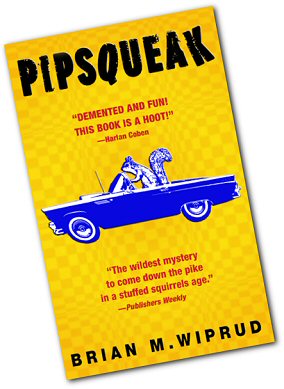A couple of years ago my parents, like a lot of elderly people, suddenly took to cruises. And in order to share their new-found love, they insisted that my wife and I join them on one.
My wife and I, just so you know, are more accustomed to kayaking the headwaters of the Amazon than standing in line at the floating buffet, so when we got an opportunity to take part in one of the "activities", we jumped.
We went snorkeling.
It's not that I'm bragging, but I've done my share of SCUBA diving. So the buoys they put up to mark the edge of the 12-foot-deep "safe zone" didn't keep us in. Before you knew it, we were free diving out past the jetty.
It must have been about 35 feet deep, but I have pretty good lungs so I had no trouble making it to the bottom and spending some time there. And that's where I saw the fish.
The fish was huge. About six and a half feet long, just hanging out above a depression in the sand. And he was beautiful.
So beautiful that I couldn't help but swim up at him, taunting him with silly "fishy fishy fishy!" grippy motions I made with my fingers as I came at him.
After the second time, I made my wife come down and take a look.
And this, among other reasons, is why I love my wife. She came. And not just as an observer, either. She came at the fish as enthusiastically as I did. Both of us coming at him broadside, our arms out in front of us, crunching up our little fingers over and over like we were aiming to tickle a two-year-old.
When we got about five feet of Mr. Fish, I had a sudden realization. I recognized him. I'd seen his kin, although they'd never been quite that monstrous.
Barracuda.
I gasped, grabbed my wife by the hand –– being sure to cover the engagement ring that –– even at that depth –– sparkled in a way that only a really expensive, flawless, colorless, perfect cut diamond could, and hauled her to the surface.
The barracuda never moved.
It could have. It could have taken off my wife's hand in an instant. It could have reamed me for having dared to enter its world. I think it was stunned by our –– my –– utter, complete ignorance of its power.
You're probably wondering what my point is. Well, I'll tell you.
This is my story. It's typical of the stories I tell, which often involve my doing something completely boneheaded but somehow managing to survive, whether it's hunting for an ATM in the slums of Buenos Aires or hiking up Half Dome with nothing more than a biscuit and a camera or climbing over the 20-foot fence at the Italian embassy in Tel Aviv to play tennis on their court.
We all have our stories. My father's stories all come down to how clever he is. My wife's stories are all about how people turn out to be surprisingly good.
I can't tell my wife's stories –– at least not with the authenticity that she can. And I don't want to tell my father's stories because I'd feel like an asshole for trying.
And here comes the part where this is relevant to film: You tell the stories you tell because they have meaning for you. And film is nothing more than pre-planned, structured, extraordinarily expensive storytelling.
What has meaning for me is the intersection of naive belief and responsibility. And if you look closely, everything I do –– every screenplay I write, every film I shoot, every story I tell –– is about that. Even my little tale about my exploits with the fish.
You don't need a dozen film credits to find out what turns you on, story wise. Think of your stories, the ones you tell the girl you're hoping to sleep with, the boss you want to let you off the hook for being late.
I'll bet that once you think of a half-dozen, you'll see a pattern.
















